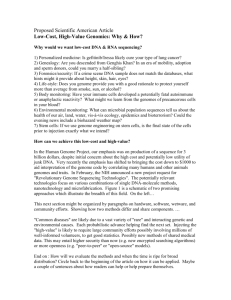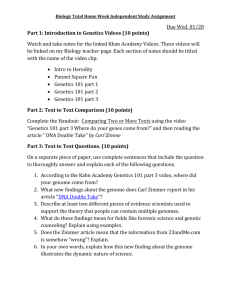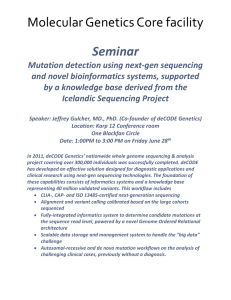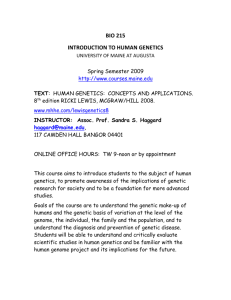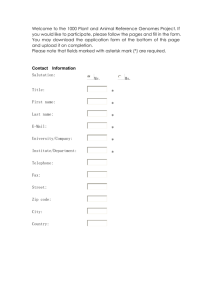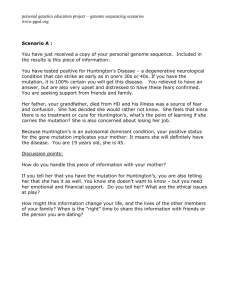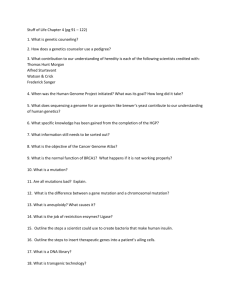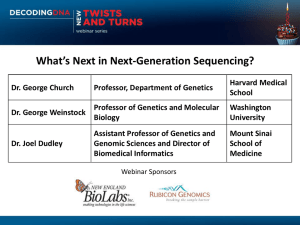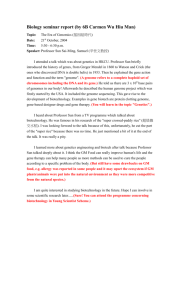personal genetics education project
advertisement
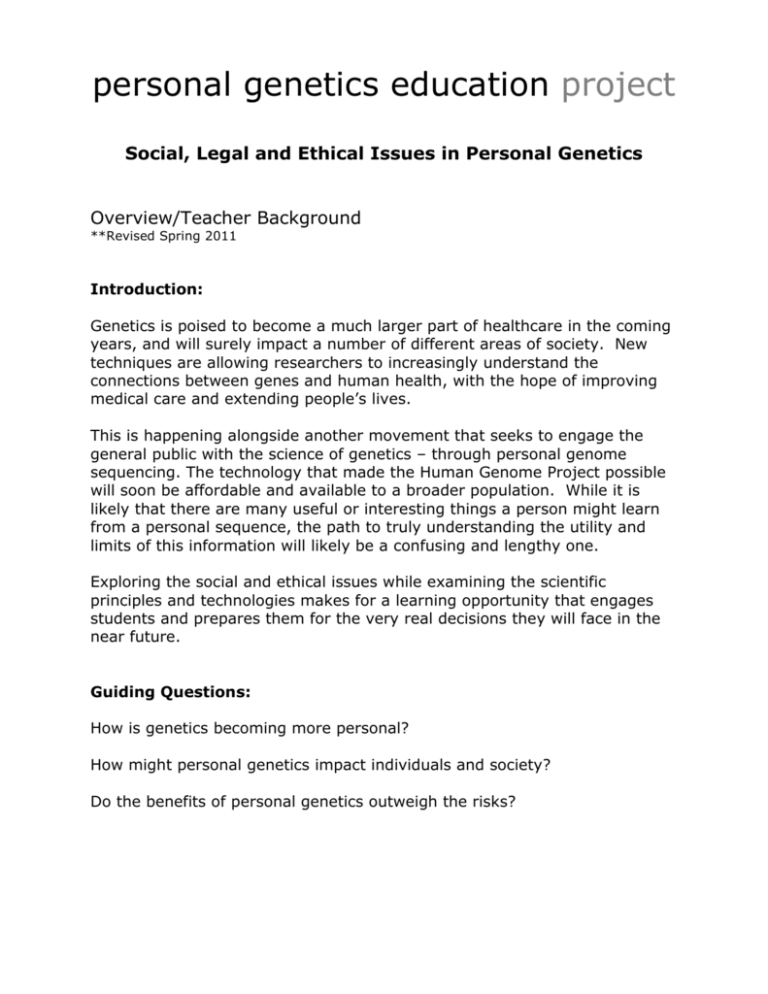
personal genetics education project Social, Legal and Ethical Issues in Personal Genetics Overview/Teacher Background **Revised Spring 2011 Introduction: Genetics is poised to become a much larger part of healthcare in the coming years, and will surely impact a number of different areas of society. New techniques are allowing researchers to increasingly understand the connections between genes and human health, with the hope of improving medical care and extending people’s lives. This is happening alongside another movement that seeks to engage the general public with the science of genetics – through personal genome sequencing. The technology that made the Human Genome Project possible will soon be affordable and available to a broader population. While it is likely that there are many useful or interesting things a person might learn from a personal sequence, the path to truly understanding the utility and limits of this information will likely be a confusing and lengthy one. Exploring the social and ethical issues while examining the scientific principles and technologies makes for a learning opportunity that engages students and prepares them for the very real decisions they will face in the near future. Guiding Questions: How is genetics becoming more personal? How might personal genetics impact individuals and society? Do the benefits of personal genetics outweigh the risks? Learning Objectives: When this unit is completed, students should be able to: List the ways genetics might impact their personal lives Explain how it will present ethical and practical challenges for society Begin to form an opinion about personal genetics See that they have a voice in the debate and develop ways they can become part of the broader discussion Preparing to Teach this Unit: This is in many ways a new area of research and inquiry, with almost daily reports of new scientific discoveries, and often, complex questions about if and how biotechnology is best applied and regulated. The Personal Genetics Education Project website at www.pged.org provides a framework for understanding what personal genetics is, how it works, its implications for medicine, the likely benefits and risks for an individual and their family. It also includes information about timeframes and stakeholders related to widespread, inexpensive personal genome sequencing Dr. Blaine Bettinger has made available a free downloadable “ e-book” of posts from his blog, The Genetic Geneaologist. Covering a wider range of topics than pgEd’s materials, it is a good foundation for teachers and students and is scientifically detailed yet accessible to a wide audience. Genomics Law Report has also released an “ e – book” version of their series “ What in ELSI is new?”, which is a compilation of essays from leading experts in genomics about the latest ethical, legal and social questions. Published in 2009, this could also serve as a reader for a longer high school or college level course. Each essay also can stand alone. Read “ Facing Life with a Lethal Gene” by Amy Harmon, published in the New York Times. This article is an excellent example of how discoveries made in the lab can profoundly affect people’s lives, the complex personal and social issues genetic testing puts into play, and is a chance to include a discussion of inheritance, dominance vs. recessive genes, and how single gene mutations can cause devastating disease. The article is supplemented with video footage that could be shown in class. It is part of the ongoing Pulitzer Prize winning series the “DNA Age” and is an excellent classroom resource. Note: If you use an RSS reader, consider subscribing to the pgEd feed on del.icio.us – this is a “ social bookmarking” site where we highlight and label scientific and popular press articles related to genomics and ethics. The pgEd feed is organized into categories using tags, and also by lesson plan within this unit (Lessons 1, 2, and 3). You can also simply visit the site at www.del.icio.us/pged . Unit Lesson Plans: 1. Genome sequencing and ethical issues: Who, what, why, and when? 2. Psychological considerations: Will personal genetics change how I think about myself? What about my family? 3. Genome sequencing and reproduction: Ethical questions now and in the future 4. Athletes, sports, and genetic testing Extending the Lesson: There is an enormous amount of information available about genetic research, public policy and legislative initiatives around biotechnology. The opportunities and ethical challenges surrounding advances in genomics are growing rapidly. Internet resources are one of the best ways to keep up with the deluge of new materials. Freely accessible journal articles can be found via the Directory of Open Access Journals and through PubMed Central, a digital library sponsored by the National Institutes of Health. Blogs and mainstream web publications can provide an engaging forum for students to debate and engage on many of the topics covered in this unit. Below are resources for more in depth reading and sites appropriate for a “web-quest” type assignment. Genome “scans” and sequencing projects: The Personal Genome Project (www.personalgenomes.org) 23 and me (www.23andme.com) 1000 Genomes Project (www.1000genomes.org) Navigenics (www.navigenics.com) The Genographic Project (https://genographic.nationalgeographic.com/genographic/index.html) Public policy and advocacy: The Genetic Alliance (www.geneticalliance.org) Center for Genetics and Society (www.geneticsandsociety.org) Genetics and Public Policy Center (www.dnapolicy.org) Council for Responsible Genetics (www.gene-watch.org) Personalized Medicine Coalition (www.personalizedmedicinecoalition.org) Journal articles and technical resources 1. Advanced sequencing technologies: Methods and goals. J Shendure, R Mitra, C Varma, G Church. Nature Reviews Genetics 5, 335-344 (May 2004) 2. The $1000 Genome: Ethical and Legal Issues in Whole Genome Sequencing of Individuals, (full text). JA Robertson. AJOB 3(3): In Focus. 3. The Diploid Sequence of a Individual Human (full text), S Levi et al. PLoS Biol. 2007 October; 5(10): e254. 4. Research Ethics Recommendations for Whole-Genome Research: Consensus Statement (full text), T Caufield et al. PLOS Biology. Vol. 6, No. 3, e73. 5. University of Washington’s Genome Sequencing Center 6. Overview of genome-wide association studies from NHGRI Writers, bloggers and current news and views: The Personal Genome (www.thepersonalgenome.com) HUGO matters – Human Genome Organization (http://www.hugointernational.org/blog/) Genome Technology Online (www.genome-technology.com) The Genetic Genealogist (www.thegeneticgenealogoist.com) Genome Boy (www.genomeboy.com) Genomics Law Report ( www.genomicslawreport.com) Genetic Future (http://scienceblogs.com/geneticfuture/) Science Blogs (www.scienceblogs.com)
